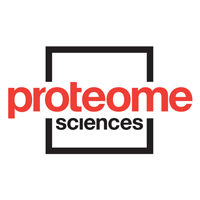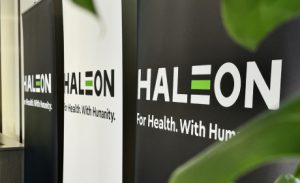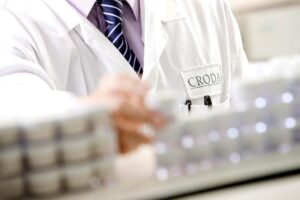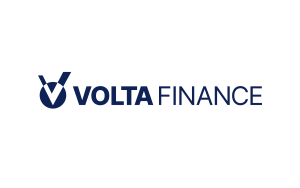Proteome Sciences plc (LON:PRM) has today announced its audited results for the year ended 31 December 2017.
Highlights:
· 23% revenue growth to £3.38m, underpinned by 79% increase in sales and royalties attributable to TMT® reagents.
· Appointment of our first Chief Commercial Officer in April 2017 to relaunch the biomarker services business which has led to the engagement of sales agents in our principal operating territories.
· Closure of the London laboratory in June 2017, with consolidation of all equipment and capabilities at our existing Frankfurt facility.
· Relocation of the Company headquarters from Cobham to the ‘knowledge quarter’ in central London
· Receipt of Good Clinical Laboratory Practice (GCLP) accreditation in October 2017 enabling our engagement in clinical stage contracts.
· Achievement of research milestone following the presentation of data from a prospective trial using the Randox Rapid Stroke Array.
Post year-end:
Extension of our exclusive licence agreement with Thermo Scientific to include patents relating to a new class of high-plex TMT® reagents.
Jeremy Haigh, Chief Executive Officer of Proteome Sciences plc, commented: “2017 was a year of significant change inside the Company with the successful implementation of numerous strategic initiatives and steady progress towards our financial goals. With the benefits of a leaner organisation, a new model for commercial engagement deployed in both our principal operating territories, and the reassurance of robust demand for our TMT® reagents, we now have the platform necessary to realise the full value of our proteomic capabilities. We look forward to strong progress during 2018, particularly growth in our biomarker services business, and to providing further updates during the course of the year.”
Chief Executive Officer’s Statement
After a year of significant change inside the company, and profound economic uncertainty outside, I am pleased to report a solid 12 months ending 31 December 2017. Revenue increased 23% to £3.38m, including a 79% increase in sales and royalties attributable to isobaric tandem mass tag (TMT®) reagents. Total costs reduced by 4.5% to £5.43m reflecting the early impact of consolidating our facilities and restructuring, which itself generated one-off costs of £0.14m from discontinued operations. Loss before tax was reduced to £2.05m but remained higher than planned. Cash reserves at the year-end were £0.91m owing to the payment of a material R&D tax credit being delayed into 2018.
In the first half of the year we implemented some important elements of the strategy which had underpinned our fundraise late in 2016, notably those affecting our physical footprint and internal capabilities. The decision to integrate all laboratory equipment and competencies at our existing facility in Frankfurt was difficult given our UK heritage, and unfortunately resulted in the redundancy of four staff members, but it has certainly enabled more efficient resource utilisation and clearer accountabilities. The associated relocation of the Company headquarters from Cobham to central London in June has afforded us much greater connectivity with the UK bioscience community and is a fundamental requirement for successful partnership and collaboration. I am pleased that the combination of these two transformational events was achieved with only minimal cost and business disruption.
Given the critical strategic importance of commercialising our proteomic services to the future success of the Company, I was delighted to appoint Richard Dennis as our first Chief Commercial Officer at the start of April. With a strong background in sales and marketing, and extensive technical experience gained at several competitor companies, Richard quickly transformed our commercial identity and ambition with his focus on face to face selling, account management, and an established client network across Europe. His arrival heralded a relaunch of our services business and inspired a complete review of our commercial practices resulting in the adoption of an agent-based sales model in our principal operating territories.
With the continuing growth of our TMT® reagents business, through an exclusive licence with Thermo Fisher Scientific, the Company is now well placed to deliver a hybrid model of product and service provision which is increasingly favoured in the bioscience community by customers seeking relationships with organisations capable of broader engagement.
Like most other sectors in 2017, the life sciences were affected by uncertainty surrounding Brexit, the unexpected outcome of the US election and impending tax reforms. The combination of these events saw many companies adopt a more conservative approach than in previous years and this caution was particularly evident in decision making around outsourcing and collaboration. As a small company trying to establish a services business we were not immune from the consequences and had to work hard building new relationships that could generate future revenues. Significant volatility in foreign exchanges throughout the year affected non-sterling denominated revenues, as well as those costs associated with our primary facility in Frankfurt, but the overall effect on EBITDA was neutral.
Staff turnover was higher than in previous years, in part a consequence of the dynamic environment in which we operate but also of a strategic decision to reduce our operating costs through natural and forced attrition. As we begin 2018 our budgeted headcount of 29 will be approximately 30% lower than at the start of 2017. This turnover included the departure in August of our Finance Director, Geoff Ellis, who had made a significant contribution to fiscal management and reporting during his three-year tenure. We are fortunate to have had established employees, in both Stefan Fuhrmann and Victoria Birse, who were well qualified to assume the roles of Finance Director and Company Secretary respectively.
After providing outstanding service and scientific insight over 20 years as a Director of the Company, Prof. William Dawson decided to stand down in the summer. We thank him for his unique contribution and are delighted to welcome Dr Ursula Ney to the Board in his place. Dr Ney’s extensive experience of the bioscience industry in a range of senior positions within both large and small companies make her ideally suited to a role on the Board at this pivotal stage in the Company’s evolution.
I would like to thank all the staff who worked for Proteome Sciences during the course of 2017, including those who have since left the Company, and trust that we can continue to realise the value of their collective contributions.
Services:
The wholescale repositioning of our proteomic services business was a basic tenet of the revised corporate strategy, and much of the year was spent establishing and communicating this. Active participation in the Alzheimer’s Association International Conference (AAIC), held in London during July, served as an effective launch platform for this revised sales initiative as well as demonstrating a more externally focused agenda.
A new commercial model was adopted from August in the critical US market using United BioChannels (UBC) as our sales agent. UBC provides us with introductions to prospective new customers and broad coverage on both US coasts, replacing direct sales staff in the region. With the prospect of working primarily on a commission basis, this model represents a more cost-effective approach to sales generation, and has been replicated in Europe from the start of 2018 using Cenibra GmbH to access German speaking countries. We have also partnered with Science Exchange, a US company which facilitates rapid, no cost engagement of new customers using pre-negotiated legal agreements, and Scientist.com, a web-based sales portal. All market support activities have been moved outside the organisation and will now be purchased as required in London.
Central to our service provision is the creation of a quality culture which can reassure prospective customers and provide a distinctive selling feature. To that end, we were very pleased to receive Good Clinical Laboratory Practice (GCLP) accreditation in October, enabling us to compete effectively for clinical stage contracts which command routinely larger budgets. This, combined with our existing ISO 9001 recertification, makes our Frankfurt facility uniquely well qualified to provide mass spectrometric proteomic services to a broad range of clients; the advantages of this are becoming increasingly evident through unsolicited engagement via our website.
Of course, attracting and retaining new business will only succeed if project execution matches customer expectations of time and cost as well as quality. The introduction of a dedicated project management function was a deliberate action to ensure better cross functional integration, management and communication of our contract service work; a series of project delivery metrics has been established to reinforce this.
Progress, in terms of explicit revenue generation, was slow in the first half of the year as might have been predicted while the new commercial model was being introduced, but we were encouraged by the increasing number of active commercial projects during the second half. Starting from a very low revenue base we saw quarterly growth from the second quarter onwards in terms of sales and orders received. The pipeline certainly looks stronger in Q1’18 both for new customers, interested in proof of concept experiments, and for existing customers wishing to extend current projects or requesting targeted assay development in support of forthcoming clinical trials. These enquiries must now be routinely and quickly converted into substantive work orders so that we can draw positive conclusions about the longer-term commercial potential of our services strategy.
Licences:
Our exclusive licence to provide Thermo Scientific with isobaric tagging reagents (TMT®) continues to be mutually beneficial. Strong sales and associated royalty payments have been essential to our revenue growth and demand increased throughout the year as TMT® reinforced its market leadership position. Cumulative sales have now exceeded $25m worldwide, a milestone which triggered a significant additional payment that we received from Thermo Scientific in the fourth quarter. Scope remains for considerable further growth as adoption by key opinion leaders spreads to the wider research community, and key to this will be the introduction of ‘higher plexing’ reagents which enable even more efficient sample analyses. Work to identify such new tags has been conducted in close association with our partners at Thermo Scientific and we hope that these improvements will start to become available during 2018.
Data from a prospective trial using the Randox Rapid Stroke Array were presented at the EuroMedLab meeting in Athens in June. The array, which incorporated some of our biomarkers, showed excellent performance in identifying stroke from mimic conditions and healthy controls, and in differentiating between ischaemic and haemorrhagic strokes. These data were sufficient to trigger an important contractual milestone with Randox which was announced on 30 June and, more critically, to suggest the utility of a future diagnostic including stroke biomarkers covered by our intellectual property (IP). Given the global incidence of stroke, and the therapeutic liability associated with inaccurate clinical diagnosis, the market opportunity for such a diagnostic is considerable. However, a clinical validation study being supported by Randox, and necessary for their CE (Conformité Européene) marked application, will now take longer than originally communicated owing largely to the speed of patient recruitment; a timeline has yet to be set but is expected to extend into 2019.
Research:
The focus on service provision has inevitably constrained our own primary research activities as we aggressively manage finite resources, but we remain indisputably a science-based company with a commitment to research through partnerships and collaboration. We have retained a strong interest in neurodegeneration and oncology, continuing our investment in commercial assay development which is relevant to these therapeutic areas (e.g. Clusterin Glycoform; Tryptophan Metabolite) and reflects recent customer feedback for services which can be readily converted into standard GCLP tools for use in clinical trials.
Our IP portfolio remains central to the Company’s valuation but continues to be the subject of review; deliberate rationalisation has been a goal over the last 18 months and the number of patent families and, importantly, the cost of their maintenance is now more in line with the expectations and resources of a company our size.
Outlook:
With the benefits of a leaner organisation, a new model for commercial engagement now fully deployed in both our principal operating territories, and the reassurance of robust and increasing demand for our TMT® reagents, we have the platform necessary to realise the full value of our proteomic capabilities. The recent extension of our exclusive license agreement with Thermo Scientific, to include patents relating to a new class of higher-plex TMT reagents currently under development, affords us further optimism.
I am conscious, however, that much remains to be done and that sentiment towards the Company will depend on positive news from our services business in the first half of 2018. As we continue to expand our range of enabling technologies we are confident that our long-term commitment to proteomics, combined with a renewed focus on the speed, cost and quality of our service delivery, will enable us to remain competitive in a dynamic market which increasingly encourages companies with broader service platforms than our own.
Our goals are heavily focused on service revenue growth and establishing enduring partnerships and collaborations. Customer engagement showed genuine signs of improvement late in 2017, with an unprecedented number of unsolicited contacts and this has continued into 2018 with booked orders in the first quarter worth £0.33m, up 37% on the same period in 2017.
Quantitative proteomics is essential for translating knowledge about the genetic basis of disease into practical, targeted therapeutics. Its place in the rapidly evolving world of drug discovery and development is undeniable, and its relevance to future transformative technologies, such as those based on artificial intelligence, assured. We remain committed to that future.
I would like to thank our shareholders for their continued support and look forward to communicating further progress and significant revenue growth during 2018.






































